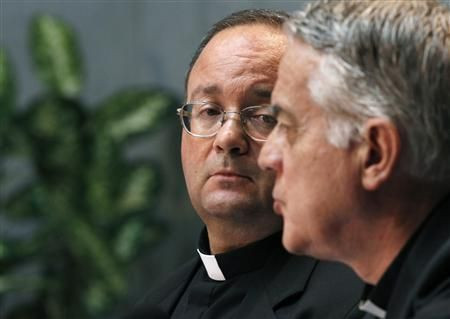Catholic splinter group sees no Vatican accord

Vatican talks with a controversial Catholic splinter group are nearing an end without any accord on reintegrating the ultra-traditionalists, including a bishop whose denial of the Holocaust has embarrassed Pope Benedict.
Bishop Bernard Fellay has said his Society of Saint Pius X (SSPX) has not succeeded in convincing Vatican officials to turn Church teaching back half a century to where it stood before the reforms of the Second Vatican Council (1962-1965).
Benedict sparked off a wave of protest in 2009 by lifting excommunications imposed on the four bishops in 1988 without first requiring them to accept his authority on Church doctrine.
His decision also prompted widespread protests, from Roman Catholics and Jews, because one of the bishops, Richard Williamson, had publicly denied the Holocaust. He has since been convicted and fined for hate speech in Germany.
We are coming to the conclusion (of the talks), because we have made the tour of the major questions raised by the Council, Fellay told the United States district of the SSPX in an interview posted on its website www.sspx.org.
Asked if Vatican officials had changed their minds during the talks, which began in late 2009, he said: I don't think that you can say that. He said the pope has a certain sympathy for us, but within limits.
AGAINST WORLD FAITH SUMMIT
The SSPX, which claims several hundred thousand followers around the world, created the only recent schism in the Church by ordaining the four bishops without Vatican approval in 1988.
The lifting of those excommunications meant the four were again recognized by the Vatican as Catholics. But without an accord, they and their priests will not be recognized as Catholic clergy or be allowed to exercise an official ministry.
The SSPX, which retains the centuries-old Latin Mass and other Catholic traditions, insists it represents the true faith and the Vatican and the rest of the 1.2 billion-strong Church went off the rails at the Council.
Benedict shares their appreciation for tradition and lifted limits on the old Latin Mass in 2007 as a concession to them, but has drawn the line on other Council reforms such as its historic reconciliation with Judaism and other faiths. It was not clear what the Vatican might do if no agreement is reached with the SSPX, which has continued operating as an independent church and ordaining new priests despite an appeal from Rome to refrain from doing so during the talks.
In the interview, Fellay repeated his criticism of Benedict for inviting world religious leaders to meet in the Italian city of Assisi in October, on the 25th anniversary of a similar faith summit organised there by the late Pope John Paul.
He said the pope might have called it because of a recent wave of anti-Christian violence in Muslim countries but said SSPX followers should pray that the Good Lord intervenes in one way or another so that it doesn't take place.
© Copyright Thomson Reuters 2024. All rights reserved.





















